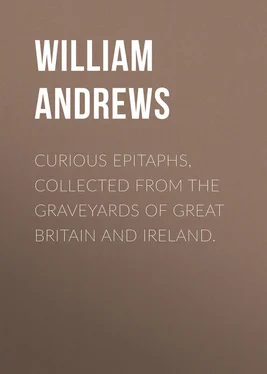William Andrews - Curious Epitaphs, Collected from the Graveyards of Great Britain and Ireland.
Здесь есть возможность читать онлайн «William Andrews - Curious Epitaphs, Collected from the Graveyards of Great Britain and Ireland.» — ознакомительный отрывок электронной книги совершенно бесплатно, а после прочтения отрывка купить полную версию. В некоторых случаях можно слушать аудио, скачать через торрент в формате fb2 и присутствует краткое содержание. Жанр: foreign_antique, foreign_prose, на английском языке. Описание произведения, (предисловие) а так же отзывы посетителей доступны на портале библиотеки ЛибКат.
- Название:Curious Epitaphs, Collected from the Graveyards of Great Britain and Ireland.
- Автор:
- Жанр:
- Год:неизвестен
- ISBN:нет данных
- Рейтинг книги:4 / 5. Голосов: 1
-
Избранное:Добавить в избранное
- Отзывы:
-
Ваша оценка:
- 80
- 1
- 2
- 3
- 4
- 5
Curious Epitaphs, Collected from the Graveyards of Great Britain and Ireland.: краткое содержание, описание и аннотация
Предлагаем к чтению аннотацию, описание, краткое содержание или предисловие (зависит от того, что написал сам автор книги «Curious Epitaphs, Collected from the Graveyards of Great Britain and Ireland.»). Если вы не нашли необходимую информацию о книге — напишите в комментариях, мы постараемся отыскать её.
Curious Epitaphs, Collected from the Graveyards of Great Britain and Ireland. — читать онлайн ознакомительный отрывок
Ниже представлен текст книги, разбитый по страницам. Система сохранения места последней прочитанной страницы, позволяет с удобством читать онлайн бесплатно книгу «Curious Epitaphs, Collected from the Graveyards of Great Britain and Ireland.», без необходимости каждый раз заново искать на чём Вы остановились. Поставьте закладку, и сможете в любой момент перейти на страницу, на которой закончили чтение.
Интервал:
Закладка:
In the churchyard of Ecclesfield, may be read the following epitaph: —
Though fond of sport, devoted of the chase,
And with his fellow-hunters first in place,
He always kept the Lord’s appointed day,
Never from church or Sunday-school away.
And now his body rests beneath the sod,
His soul relying in the love of God.
Of the many epitaphs on sportsmen to be seen in Nottinghamshire, we cull a few of the choicest. Our first is a literal copy from a weather-worn stone in Eakring churchyard, placed to the memory of Henry Cartwright, senior keeper to his Grace the Duke of Kingston for fifty-five years, who died February 13th, 1773, aged eighty years, ten months, and three weeks: —
My gun discharged, my ball is gone
My powder’s spent, my work is done,
those panting deer I have left behind,
May now have time to Gain their wind,
Who I have oft times Chass’d them ore
the burial Plains, but now no more.
We next present particulars of a celebrated deer-stealer. According to a notice furnished in the “Nottingham Date Book,” the deeds of Tom Booth were for many years after his death a never-failing subject of conversational interest in Nottingham. It is stated that no modern deer-stealer was anything like so popular. Thorsby relates one exploit as follows: “In Nottingham Park, at one time, was a favourite fine deer, a chief ranger, on which Tom and his wily companions had often cast their eyes; but how to deceive the keeper while they killed it was a task of difficulty. The night, however, in which they accomplished their purpose – whether by any settled plan or not is not known – they found the keeper at watch, as usual, in a certain place in the park. One of them, therefore, went in an opposite direction in the park, and fired his gun to make the keeper believe he had shot a deer; upon which away goes the keeper, in haste, to the spot, which was at a very considerable distance from the place where the favourite deer was, and near which Tom Booth was skulking. Tom, waiting a proper time, when he thought the keeper at a sufficient distance for accomplishing his purpose, fired and killed the deer, and dragged it through the river Leen undiscovered.” Booth was a stout man, and by trade a whitesmith. The stone marking the place of his interment is still in good preservation, and stands in St. Nicholas’ burial-ground, against the southern wall of the church. It bears the following inscription: —
Here lies a marksman, who with art and skill,
When young and strong, fat bucks and does did kill.
Now conquered by grim Death (go, reader, tell it!)
He’s now took leave of powder, gun, and pellet.
A fatal dart, which in the dark did fly,
Has laid him down, among the dead to lie.
If any want to know the poor slave’s name,
’Tis old Tom Booth, – ne’er ask from whence he came.
Old Tom was so highly pleased with the epitaph, which was written before his death, that he had it engraved on the stone some months before its services were required. In addition to the epitaph itself, the head-stone was made to include Booth’s name, &c., and also that of his wife, blank places being left in each case for the age and time of death. Booth’s compartment of the stone was in due course properly filled up; but the widow, disliking the exhibition of her name on a tombstone while living, resolved that such stone should never indicate her resting place when dead; she accordingly left an injunction that her body be interred elsewhere, and the inscription is incomplete to this day.
Some time before Amos Street, a celebrated Yorkshire huntsman died, a stone was obtained, and on it engraved the following lines: —
This is to the memory of Old Amos,
Who was when alive for hunting famous;
But now his chases are all o’er,
And here he’s earth’d, of years four score.
Upon this tomb he’s often sat
And tried to read his epitaph;
And thou who dost so at this moment
Shall ere long like him be dormant.
Poor “Old Amos” passed away on October 3rd, 1777, and was buried in Birstal churchyard. The foregoing inscription may still be read.
The Rev. R. H. Whitworth tells us: “There is an old monument in the south aisle of Blidworth Church, to the memory of Thomas Leake, Esq., who was killed at Blidworth Rocking in A.D. 1598. He may be regarded as the last of the race who sat in Robin Hood’s seat, if those restless Forest Chiefs, typified under that name, can be supposed ever to have sat at all. Leake held office under the Crown, but was as wild a freebooter as ever drew bow. His character is portrayed in his epitaph —
HERE RESTS T. LEAKE WHOSE VERTUES WEERE SO KNOWNEIN ALL THESE PARTS THAT THIS ENGRAVED STONENEEDS NAVGHT RELATE BVT HIS VNTIMELY ENDWHICH WAS IN SINGLE FIGHT: WYLST YOUTH DID LENDHIS AYDE TO VALOR, HEE WTH EASE OREPASTMANY SLYGHT DANGERS, GREATER THEN THIS LASTBVT WILLFVLLE FATE IN THESE THINGS GOVERNS ALLHEE TOWLD OVT THREESCORE YEARS BEFORE HIS FALLMOST OF WCH TYME HE WASTED IN THIS WOODMVCH OF HIS WEALTH AND LAST OF ALL HIS BLOOD
The border of this monument is rudely panelled, each panel having some forest hunting subject in relief. There are hounds getting scent, and a hound pursuing an antlered stag; a hunting horn, ribboned; plunging and flaying knives, a cross-bow, a forest-bow, two arrows, and two hunters’ belts with arrows inserted. This is his register —
There is a captivating bit of romance connected with Leake’s death, which occurred at Archer’s Water. Although somewhat ‘provectus in ætate,’ he had won the affections of the landlady’s daughter, much to the annoyance of the mother. Archer’s Water was on the old driftroad by Blidworth, from Edinburgh to London, that by which Jeannie Deans travelled, and over which Dick Turpin rode. Hundreds of thousands of Scotch cattle went by this way to town, and there was a difficulty connected with a few of them in which Leake was concerned, and a price being set upon his head, his mother-in-law, that was to be, betrayed him to two young soldiers anxious to secure the reward, one of whom was, in the mother’s eyes, the more favoured lover. Tom was always attended by two magnificent dogs and went well armed. Thrown off his guard he left his dogs in an outhouse, and entering the inn laid aside his weapons, when he was set upon and overpowered, and like many better men before him, slain. The name of a Captain Salmond of the now extinct parish or manor of Salterford is connected with this transaction. The date of the combat is 2nd February, being the festival of the Presentation of Christ in the Temple, with which the highly interesting and historical observance of Blidworth Rocking is connected. Within the memory of living men, a baby decked with such flowers as the season afforded, was placed in a cradle and carried about from house to house by an old man, who received a present on the occasion. As the church is dedicated to St. Mary in connection with the Purification, the 2nd of February being the Feast Day, this is probably an interesting reminiscence of some old species of Miracle Play, or observance connected with the foundation. Anciently people from all neighbouring counties used to attend this season. Forest games were played, and amid the attendant licence and confusion, Leake came to his last grief. Not only in the church does this Ranger of the Blidworth Wood, for this was his office, possess a memorial. A large cross was erected, now standing at Fountain Dale, thus inscribed: —
Читать дальшеИнтервал:
Закладка:
Похожие книги на «Curious Epitaphs, Collected from the Graveyards of Great Britain and Ireland.»
Представляем Вашему вниманию похожие книги на «Curious Epitaphs, Collected from the Graveyards of Great Britain and Ireland.» списком для выбора. Мы отобрали схожую по названию и смыслу литературу в надежде предоставить читателям больше вариантов отыскать новые, интересные, ещё непрочитанные произведения.
Обсуждение, отзывы о книге «Curious Epitaphs, Collected from the Graveyards of Great Britain and Ireland.» и просто собственные мнения читателей. Оставьте ваши комментарии, напишите, что Вы думаете о произведении, его смысле или главных героях. Укажите что конкретно понравилось, а что нет, и почему Вы так считаете.












